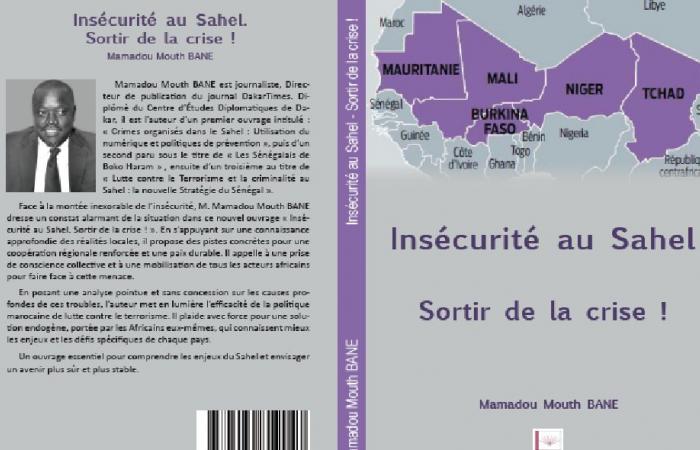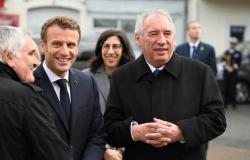In this work, Mamadou Mouth Bane, journalist-communicator, founder and Publication Director of the daily newspaper “DakarTimes”, addresses the many challenges facing the Sahel, while outlining possible solutions. Although discreet, for years he has supported major figures in the socio-economic and political world of Senegal, and even the sub-region.
The main themes developed in this work include:
• Security and political issues in the Sahel;
• The Alliance of Sahel States (AES): a regional alternative;
• The Moroccan offer for the Sahel;
• South-South and North-South cooperation;
• ECOWAS reform for a unified strategy;
• The challenge of restoring trust;
• Safe co-construction.
This book constitutes a significant contribution to reflections on the crises in the Sahel and their possible solutions, with a vision centered on the empowerment of local actors.
An innovative approach that respects the sovereignty of African countries is essential to restore trust and guarantee effective cooperation. This involves defining local strategies, accompanied by measured support from foreign partners.
1. Security and political issues in the Sahel
• The Sahel region is marked by political and security crises aggravated by internal instability and weak state resources.
• The main challenges:
o Democratic challenge: Resolution of internal political contradictions.
o Security challenge: Strengthening the rule of law and the fight against terrorism.
• Comprehensive inter-African cooperation, supported by foreign powers, is necessary to establish a climate of peace and stability.
________________________________________
2. The Alliance of Sahel States (AES): A regional alternative
• Created by Mali, Burkina Faso and Niger, the AES advocates political and economic integration to ensure security and development.
o Main objective: Collective defense and mutual assistance against threats (terrorism, external aggression).
o Vision: Go beyond traditional partnerships deemed ineffective (e.g. withdrawal from the G5 Sahel and break with France).
Concrete examples:
• Military successes: Reconquest of Kidal in Mali after the departure of the Barkhane and Takuba forces.
• Military cooperation: Joint exercises of the armed forces of member and allied countries (eg: Togo, Chad).
________________________________________
3. The Moroccan offer for the Sahel
• Royal initiative of Morocco:
o Offers access to the Atlantic via the strategic port of Dakhla.
o Promotes economic integration and infrastructure development in AES countries.
• The Morocco-Nigeria gas pipeline project:
o Axis of regional energy cooperation, integrating the Sahel into the African energy transition.
Expected impacts:
• Inclusive economic development.
• Modernization of infrastructure and free movement of goods and people.
________________________________________
4. South-South and North-South cooperation
• South-South cooperation, like that promoted by the AES, is essential, but it must be linked to diversified international partnerships (North-South).
• The AES aspires to impose its political vision while cooperating with global players (Europe, Russia, United States).
________________________________________
5. Prospects and challenges
• To succeed:
o Establish legitimate governments to gain the trust of partners.
o Strengthen military capabilities through modern equipment and training programs.
o Mobilize funding for sustainable projects, while preserving strategic autonomy.
• Main risk:
o Isolation in the face of the withdrawal of traditional Western support, which could limit operational capabilities.
Reforming ECOWAS for a unified strategy
• Current problem: The separation between the Alliance of Sahel States (AES) and ECOWAS weakens the fight against transnational terrorist groups that operate beyond the borders of the two entities.
• Recommended solution:
o Reform ECOWAS by integrating the concerns of the AES for better adaptation to current security and political challenges.
o Unite the forces of the two blocs to counter the terrorist threat, overcoming the divisions linked to regime changes through coups d'état.
The G5 Sahel and its weaknesses
• Failures observed:
o Lack of involvement of neighboring countries (Ivory Coast, Senegal, Morocco, etc.) in the functioning of the G5 Sahel.
o Coup d'état and political instability in Mali, Burkina Faso, and Niger, hampering initiatives.
o Flaws in the preparation of structuring projects, leading to disengagement from international donors.
• Impact: Migration of founding members to the AES, leaving the G5 weakened.
The emergence of the Coalition for the Sahel
• Objective: Relaunch a collective and united response to the security crisis.
o Emphasizes an integrated approach (security, politics, development) in response to the needs of local populations.
• Expected results: Better coordination between regional and international actors to compensate for the shortcomings of existing organizations.
A geopolitical repositioning
• Foreign influences:
o The AES is moving closer to Moscow, marking a break with Western support (France and the United States).
o ECOWAS remains linked to traditional Western partners, amplifying a “cold war by proxy”.
• Proposed solutions: Promote interregional cooperation between ECOWAS, ECCAS, and other blocs such as the AMU to maximize synergies in the fight against terrorism.
________________________________________
Key points
1. Strategic unity necessary: Internal divisions (AES vs ECOWAS) weaken the security response in the Sahel.
2. Imperative reforms: Reinvent ECOWAS and the G5 Sahel to integrate current political and security dynamics.
3. Geopolitical balance: Reduce dependence on foreign powers by promoting inclusive African solutions.
Trust Restoration Approach
1. Assessment and review of relationships:
o A critical assessment of the relations between the former colonies of the Sahel and their Western partners is necessary.
o Cooperation should be reoriented towards a model based on respect for African sovereignty.
2. Alliance dilemma:
o Replacing one power with another (France with Russia, for example) is not a lasting solution.
o African leaders must favor balanced and co-constructive cooperation, taking advantage of the contributions of each partner.
3. Role of foreign partners:
o Although foreign forces have reduced certain threats (e.g. AQIM according to the French authorities), their contribution is contested by the leaders of the AES.
o In the future, foreign partners should limit themselves to a role of logistical and financial support, while respecting local initiative.
4. Recognition of local capacities:
o African military executives are trained to design security plans adapted to the regional context.
o African states must demonstrate their autonomy and effectiveness while maintaining sincere relationships with their partners.
5. Strategic impact:
o The stability of the Sahel is also crucial for the security of Western powers, due to links between local terrorist groups and potential threats in Europe.
o North/South cooperation must therefore be part of a long-term strategic vision.
.9 Safe co-construction
• Mission of Jean-Marie Bockel: Appointed “personal envoy” of Macron to reform relations with four African countries hosting French military bases (Senegal, Ivory Coast, Gabon, Chad).
• Objectives: Establish balanced and mutually beneficial partnerships, by adapting military and civil cooperation to each country, with a co-construction approach, respecting local needs and French interests.
• Visits by Bockel: He visited these countries to discuss the revision of the French military system. The French bases are strategic for rapid intervention in the event of a crisis in West and Central Africa.
• Sovereignty issues: Host countries have a say on the military presence, with recent changes (eg Senegal). France wants to offer a less visible but reliable partnership, while maintaining bases for strategic reasons.
• Competition from other powers: Russia offers an alternative to military cooperation, notably with the Africa Corps, and is also positioning itself in the economic field with projects such as Russian chambers of commerce and banks in Africa.
6.10 The energy challenge and insecurity in the Sahel
• Energy deficit: The Sahel countries (Mali, Burkina Faso, Niger) suffer from frequent power cuts, slowing down economic activities and creating a dependence on generators.
• Energy solutions: Initiatives, such as the construction of a solar power plant by the Russian company Novawind in Mali, aim to resolve the energy deficit. Similar projects exist in Burkina Faso and Niger.
• Gas pipeline projects: The Nigeria-Morocco gas pipeline is part of efforts to improve the region's energy supply and support small businesses and youth in their economic development.
• Role of States in security and the economy: The fight against insecurity must not be limited to military actions. Investments in energy and economic support are essential to reducing poverty, marginalization and insecurity.
While waiting for the rush to read this work by a great pan-Africanist, this summarizes the main issues concerning military and energy cooperation in the Sahel, as well as the desire to diversify international partnerships for a more stable and emerging Africa.
What if West African diplomacy introduced it among its levers?
Whoever lives will see, says the adage!
In the meantime, the Leral Group wishes Mamadou Mouth Bane every success!






